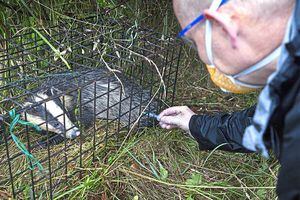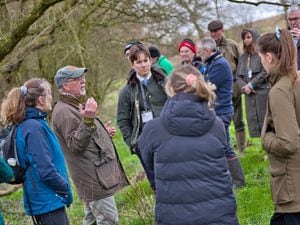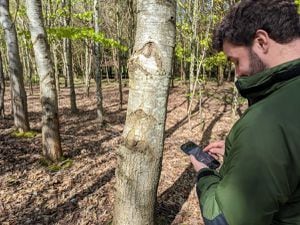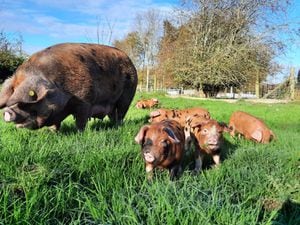Badgers vaccinated in pioneering Shropshire trial
A project got under way in Shropshire today as a colony of badgers was trapped and vaccinated.

The dawn operation took place at an undisclosed farm in the county, thanks to a free vaccination programme offered by the Shropshire Badger Group.
Oliver Cartwright, NFU Shropshire spokesman, said: "The NFU is supportive of the use of vaccines because they have a role to play in the long-term control of the disease, however, it will not cure a badger that is already infected, so simply its effectiveness, without other measures, will be limited."
As day broke on the farm a colony of badgers were quietly trapped and vaccinated, without fuss and with the full co-operation of the farmer.
It was a very different scenario to the badger culling that is taking place in Gloucestershire, which has been met with dismay by those who have organised the first of six vaccination schemes that will last for the next four years.
Jim Ashley is the chairman of the Shropshire Badger Group that has championed the cause of the badger for more than two decades.
He insisted that it was important to add to the debate of badger control by embarking on the vaccination programme.
"Badger culling has never had an effect on TB in cattle population," he said.
"When Owen Paterson was pledging to roll out the latest culling we thought 'let's try and do something to try and show the farming community that we do care about getting rid of this disease' so we decided to try and offer a vaccination. "
The group wrote 250 letters to farmers asking them to undertake vaccination, but received not one response. However after an appeal in the Shropshire Star offering free vaccination for the first six farmers to come forward, nearly a dozen got in touch and now the four year vaccination scheme will begin on six of those farms.
Mr Ashley said: "We believe that if we can vaccinate 50 per cent of the badger population the disease will ultimately grow out.
"Vaccination doesn't cure TB but reduces the level of infection which means the infected badger is less likely to pass on the disease. And as a badger's lifespan is three to five years, the four years is hopefully the right time period."
Mr Ashley paid tribute to the volunteers in the Badger Group who have paid £750 of their own money to train and qualify to vaccinate the animals.
The Badger Group has also spend thousands of pounds making the cages needed to trap and vaccinate the animals.
"We would appreciate any help we are offered in carrying out this work," added Mr Ashley.
He claimed that in modern day Britain the badger had been persecuted for four decades.
"In the 1960s England was virtually TB free. Numbers started to creep up and people started looking for reasons. In the early 1970s a dead badger, which tested positive for TB, was found on a farm in Gloucester. Badger culling then started with badger setts gassed and the animals suffering a long, slow death."
"In 1998 the Labour Government brought in a five year cull, that ran for seven years before the 2001 foot and mouth epidemic."
Mr Ashley said the epidemic not only suspended the cull but suspended TB testing.
"When Britain was foot and mouth free, cattle herds were moved from the south west across the country to get the farming industry moving again. Because testing had stopped for a couple of years, reactor levels went through the roof. They were bound to as TB had been allowed to expand."
He said that badger groups were having to vaccinate badgers because Britain wouldn't vaccinate cattle.
"Every time badger protection groups talk about vaccination in cattle, they are told it is years away, there is no real will to do it," he added. "There is a perfectly reasonable cattle vaccine that could be used, trialled and approved by the EU. But it would mean some countries, including China, wouldn't then take our beef.
"We have TB vaccination in the human population. We believe it should be also in the cattle population.
"One reason is because the TB test has so many flaws. It is 50 years old and gives too many false positives and negatives. Many animals will test inconclusive or clear then when it goes to the abbatoir at the end of its life it is found to be riddled with TB."
Compared to TB in cattle, Mr Ashley said Shropshire badger group did not believe there was a great deal of TB in the badger population.
He added: "We all held our breath during the Labour government's trials. During that time 11,000 badgers were cage trapped and shot.
"Of those just 1,545 were found to be carrying TB and of those just 166 were infectious – a tiny percentage.
"At the same time Shropshire took road casualties to the government testing centre and in 18 months just two of the 252 found dead on the roads were found to be infectious."





